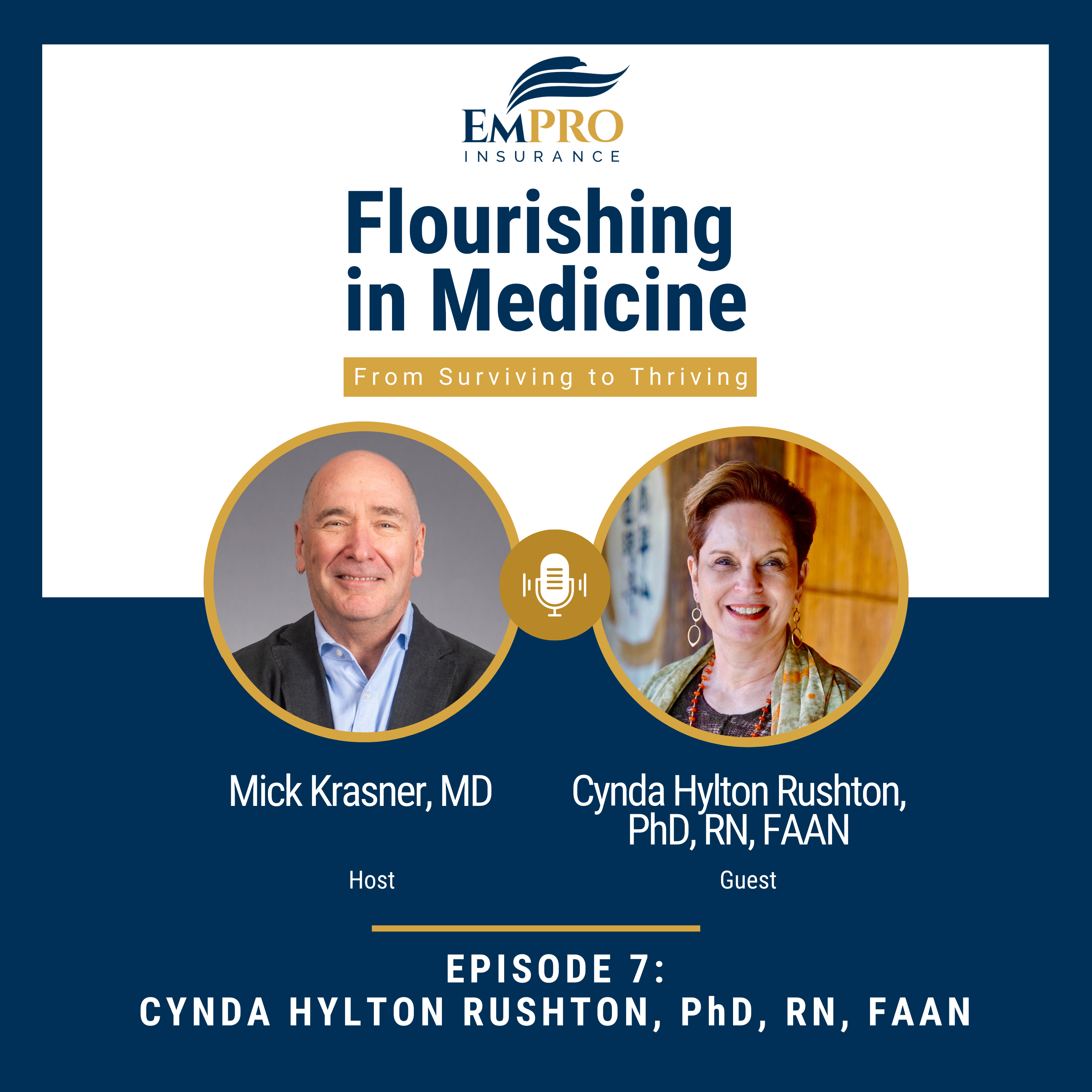Listen to Episode 7 Below:
Show Notes:
The guest for this podcast was Cynda Hylton Rushton, PhD, RN, FAAN, the Anne and George L. Bunting Professor of Clinical Ethics at the Berman Institute of Bioethics/School of Nursing and Professor of Nursing and Pediatrics, at the Johns Hopkins University. A clinician, educator, researcher and advocate for compassionate health care with decades of nursing experience, Dr. Rushton’s work focuses on clinical ethics, palliative and end-of-life care, particularly for children, as well as integrated organizational change and ethical leadership. She has led numerous initiatives to cultivate contemplative practices that foster awareness, inquiry and resilience in complex health care settings and to address the detrimental effects of moral distress on clinicians, patients and families. She designed, implemented and evaluated the Mindful Ethical Practice & Resilience Academy (MEPRA) for nurses and has published hundreds of articles and book chapters on related topics. Since 2001, she has served as a teacher and collaborator in Upaya’s Being With Dying Professional Training program and as core faculty in G.R.A.C.E.
Along with Roshi Joan Halifax and Al Kaszniak, she has collaborated in the development of a framework and strategies for addressing moral distress and understanding the process of moral discernment. She has received fellowships from the Robert Wood Johnson Foundation (Executive Nurse Fellow), Mind and Life Institute and Kornfeld Foundation. Currently her research focuses on the cultivation of moral resilience in response to adversity created by ethical conflicts and designing a culture that fosters ethical practice. Her book, “Moral Resilience: Transforming Moral Suffering in Healthcare” is published by Oxford University Press.
In this interview, Cynda discusses her journey into nursing, and how it chose her rather than the other way around, recounting early experiences which fueled a passion for patient care. The interview touches on pivotal moments her career, including exposure to end-of-life situations and participation in the Being with Dying program at the Upaya Zen Center, which significantly influenced her approach to patient care. The conversation delves into the significance of contemplative practices in healthcare, emphasizing the transformative impact of mindfulness and awareness on professional flourishing and the ability to navigate ethical challenges. She also shares insights into the Mindful Ethical Practice and Resilience Academy (MEPRA), a program she designed to support nurses in cultivating mindfulness, resilience, and moral efficacy. The MEPRA program aims to address burnout and foster a culture of ethical practice, with positive outcomes reported in participants. Additionally, she discusses the concept of moral resilience as the capacity to sustain or restore integrity in the face of moral complexity and distress, emphasizing the importance of self-stewardship and aligning personal values with professional practice.
Cynda then delves into the idea of maintaining wholeness amid complexity and confusion, cultivating moral resilience through a grounded sense of integrity. Rushton emphasizes the role of courage in speaking up when values are threatened and highlights the significance of listening to one’s conscience. She notes that integrity involves embracing imperfection, holding one’s experiences with compassion, and acting when needed, even if it means saying no or removing oneself from unhealthy situations. Rushton also explores the complexity of integrity in professional contexts, acknowledging the need for individuals to reexamine assumptions and beliefs. The conversation touches on the multifaceted nature of suffering, the importance of precise language in addressing challenges, and the value of turning toward difficulties as a path to transformation. Reflecting on insights from her experiences, she shares a poignant story from an ethics consultation that underscored the profound impact of truly listening and connecting with patients. The interview concludes with a discussion about large-scale change and the Conscious Full-Spectrum Approach, focusing on the significance of aligning actions with values and transforming organizational patterns. Throughout the conversation, Rushton’s depth of understanding and compassionate approach to ethics and well-being in healthcare shines through, offering valuable perspectives for professionals navigating complex and morally challenging situations.
Guest:
Cynda Hylton Rushton, PhD, MSN, BSN, RN, FAAN
Faculty Page, Johns Hopkins University:
https://nursing.jhu.edu/faculty-research/faculty/directory/cynda-rushton/
About the MEPRA Program at Johns Hopkins:
https://giving.jhu.edu/story/cynda-rushton-moral-distress/
Other mentions or references during the podcast:
Upaya Zen Center Being with Dying Program:
https://www.upaya.org/social-action/being-with-dying/
Research on the MEPRA Program:
Rushton, CH, et al. Mindful Ethical Practice and Resilience Academy: Equipping Nurses to Address Ethical Challenges. Am J Crit Care (2021) 30 (1): e1–e11., https://doi.org/10.4037/ajcc2021359
Moral Resilience Book:
Rushton, CH, ed. Moral Resilience: Transforming Moral Suffering in Healthcare. Oxford University Press; 2018, doi: https://doi.org/10.1093/med/9780190619268.003.0011
Warren Reich:
Reich, WT. Speaking of suffering: a moral account of compassion. Soundings 1989 Spring;72(1):83-108.
Monica Sharma’s Conscious Full Spectrum Approach: Radical Transformational Leadership
Strategic Action for Change Agents. North Atlantic Books; 2017.
